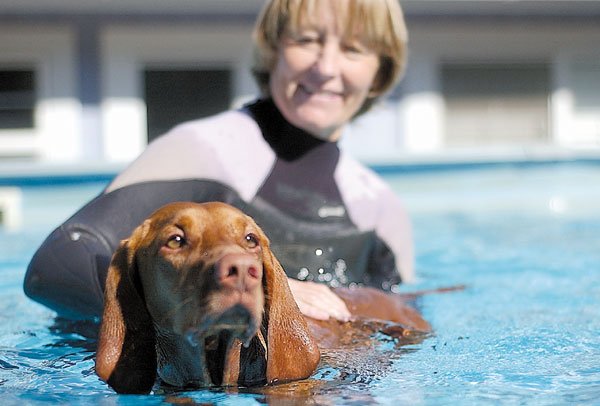Aromas
– Keillor has been working hard to overcome his hip injury. His
owner, Debbie Neel, isn’t exactly sure how he injured it, but she
has a feeling her other dog, Kelsey, was playing too rough. When
the 3-year-old sits, one side of his pelvis is higher than the
other; something is slightly out of plac
e and it’s painful for him to move around.
Aromas – Keillor has been working hard to overcome his hip injury. His owner, Debbie Neel, isn’t exactly sure how he injured it, but she has a feeling her other dog, Kelsey, was playing too rough. When the 3-year-old sits, one side of his pelvis is higher than the other; something is slightly out of place and it’s painful for him to move around.
Fortunately for Keillor, Neel has brought him to a specialist for physical therapy.
Keillor (named after author Garrison Keillor) is in the middle of his second appointment with Kathy Kern, a registered vet technician who’s been providing water therapy to injured dogs at her Aromas home since 1983.
Kern, 53, guides Keillor through a pool of 90 degree water as he swims, massaging his injured hip, periodically checking his heart rate and making sure he uses the injured muscle to increase circulation.
“Good Keillor dogger,” Neel encourages from a lawn chair, as she watches the German bird dog paddle slowly around.
Tomorrow, Keillor will have his third and final appointment, and this should be enough to stimulate a full recovery, Kern says.
“There are exercises you can do in water that you just can’t do on land,” Kern explains. “If only they could ride a bike.”
Swimming in the water, which is warm enough to loosen muscles and where there is little resistance, Keillor is experiencing full range of motion without pain – something he hasn’t been able to do since 6-month-old Kelsey got a little overzealous during playtime. This is an incredibly effective way to overcome injury or recover from surgery or stroke in a matter of just days, according to Kern.
“So much of rehab can be done even just seven to 10 days after surgery, and it cuts down on recovery time so drastically,” she says. “What we do here works very well and lasts a long time. It’s not like a chiropractor where they lie you still and they make the adjustments. Here, they’re (the dogs) making all the adjustments themselves.”
Kern got involved in canine physical therapy about 20 years ago after she was in a car accident. She couldn’t use her arms, so she went to a physical therapist with an indoor pool.
She regained use of her arms and decided to take a graduate course in (human) physical therapy herself. And, for the already licensed vet tech, change-over was intuitive and the rest was history.
“A lot of people say ‘Oh, I have a pool, I’ll just swim my dog myself.’ But it doesn’t work like that. You have to be able to pick up on certain things. I’ve had dogs come in with pneumonia and their owners didn’t even know. Older dogs, you can get them swimming and they can have heart attacks or asthma attacks,” Kern says.
But by checking their heart rate, the color of their gums and their breathing every few minutes, Kern can tell when the dog has had enough exercise for one session. She knows which muscles to massage and how.
The pool she uses is designed with a battery-powered lift to get older and larger dogs in and out of the water, which is kept between 88 and 89 degrees and doesn’t include chlorine. And at the end of a dog’s rehab, Kern sits down with the owner to develop a plan for diet and exercise to keep the pooches from having to return.
Kern treats about 30 dogs a week; about 50 percent of the dogs she treats are recovering from surgery or injury and the other 50 percent are dealing with arthritis.
But using therapy early on is a great way to ease arthritis or even avoid it, according to Kern. She makes sure her own dogs swim regularly, although she enlists another vet tech for the job since her dogs would rather play with her than work.
“I have an Australian shepherd-cross who’s 17 and you’d never know it because he swims,” she says.
As if all that weren’t enough, Kern’s taking her LSAT test to enter the Monterey College of Law, hoping to practice child advocacy law “as a second career.”
But the old, the injured and the post-surgery dogs of Central California need not despair; Kern isn’t going anywhere and neither is her practice.
“I won’t give this up,” she said. “This is my baby.”
Kern can be reached at the Animal Fitness Center at (408) 997-0828 or (831) 726-3349.














